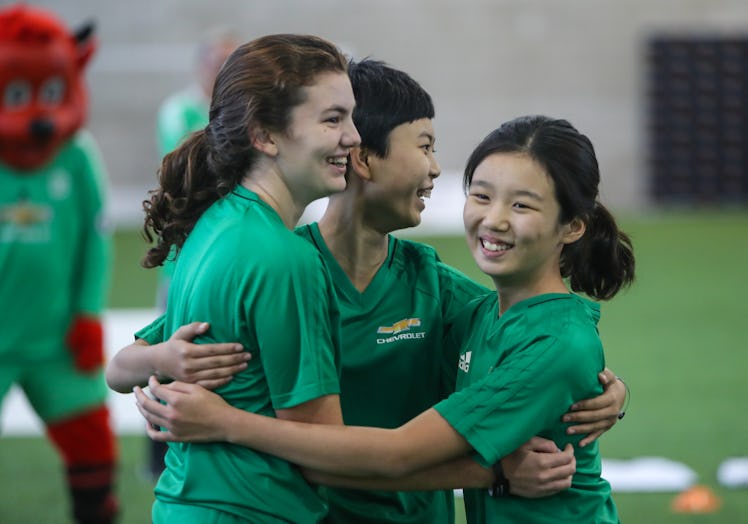Teach Your Daughter to Be a Team Player on the Field and She’ll Be a Better Person Off of It
Team sports won’t just teach your daughter about winning and losing — the experience can change the way she forms relationships with others throughout life.

The following was produced in partnership with Chevrolet’s GoalKeepers Project. The Chevrolet GoalKeepers Project demonstrates the possibilities that sports can provide for girls worldwide. Inspire girls to #BeAGoalKeeper with these tips from Fatherly.
Team sports won’t just teach your daughter soccer skills or the life lessons of winning and losing. As one of her first experiences with a tight-knit social group, the experience can change the very way she forms relationships with others throughout life.
“Team sports are one of the first places children start to sense the ‘we’ construct, which will drive healthy social interactions the rest of their lives,” says Dr. John Mayer, clinical psychologist, author, and president of the International Sports Professionals Association.
READ MORE: The Fatherly Guide to Socializing Kids
Cognitively speaking, people aren’t born with a “we” orientation to the world. In fact, children might seem like raging narcissists because, well, they kind of are. Humans are born helpless and dependent on others, which means the “me” orientation is hardwired for an infant’s survival. But to be a successful adult in the workplace, socially, and in interpersonal relationships, that mentality has to shift. For most girls, Mayer says the process starts around middle school age, although some don’t fully internalize it until high school.
Regardless of where your daughter is at developmentally, modeling a positive we mentality should begin as soon as possible. Historically, the sports arena is a great starting line — as long as adults don’t get in the way. Dr. Jim Taylor, sports psychologist and author of Positive Pushing: How to Raise a Successful and Happy Child cautions against buying into what he calls the youth sports development complex. “Unfortunately, in youth sports in the last couple decades there’s been a shift away from fun and focusing on the kids to fame, fortune, and winning,” he says.
Fame and fortune should be the last thing on a child’s mind (or their parent’s) as she lines up to take a corner kick. And, with apologies to Vince Lombardi, winning should be secondary to having fun and socializing with teammates. But it can be hard for kids to escape the me orientation. They’re surrounded by media that lauds sports stars as heroes. And their well-meaning parents often lean in a little too loudly from the sidelines to maximize a child’s playing time and social media likeability: “Three goals for Harper today!!!!”
“With the Millennial generation, we’ve seen kids moving into adulthood that don’t have the social skills, the social maturity, that prior generations have had,” says Mayer. Both Mayer and Taylor acknowledge there are other factors at play here, like less social interaction among children due to time spent on electronic devices, and school budget cuts that eliminate activities, but within the range of what parents can control, team sports are a relatively easy way to promote a we mentality and the social benefits that come with it.
Mayer recommends parents emphasize the team over the individual (So, “Go Wildcats!” not “Go Matilda!”) and applaud effort over statistical achievement. When something is achieved, be clear that it’s the team, not one player, that achieved it. Instead of focusing on the kid who scored the goal, talk about the strategy the team executed that led to the goal.
Taylor offers parents three key considerations to help them ensure their kids get the most out of team sports. First, ask yourself why your kid is playing and make sure your own priorities are straight. Sorry, but even the most genetically gifted child is highly unlikely, statistically speaking, to become a professional athlete. Youth sports need to be about having fun and socializing with other kids. Second, make sure your daughter’s sports team or program reflects those values. Finally, in the context of practices and games, parents should emphasize the team dynamic — elements like the ability to communicate effectively, collaborate, deal with different personality types, and lead as well as follow. Those are the skills that will ultimately benefit kids as they grow up and have to work with others in the real world off the pitch.
This doesn’t mean you shouldn’t encourage your child to do her personal best. She should absolutely put forth her top effort — but it should be for the benefit of the team, which goes beyond scoring goals. It also includes her efforts on the bench to encourage and support her teammates, and her sportsmanship regarding the team’s competitors. “The emphasis is on learning to play well with others,” says Taylor. “Social skills go a lot farther in life than how well you can kick a ball into a net.”
5 Ways Parents Can Use Team Sports to Build a “We” Mentality
- Keep it about fun and socializing to teach key skills like communication, collaboration, and dealing with different personalities.
- Make sure the team or program shares your values. If the focus is all on winning, kids won’t reap the benefits of playing.
- Emphasize the team over individuals. The takeaway lesson for your kids: Strategy and execution led to the goal, not one player.
- Applaud effort over achievement. This reminds kids that no goal is achieved without hard work and cooperation.
- Encourage personal bests that benefit the team, like supporting teammates from the bench and showing good sportsmanship.
This article was originally published on